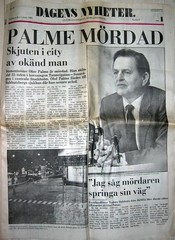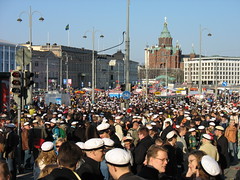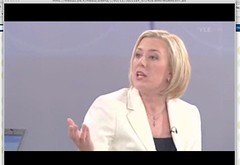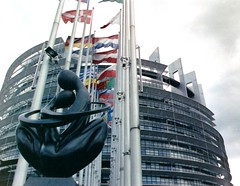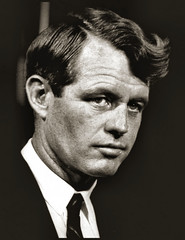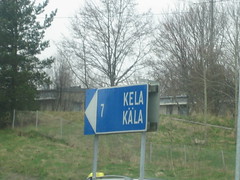Monday, June 08, 2009
Shaken, Yet Still Standing
- True Finns: Most of Finnish media is making the wrong analysis on this political party. Putting the party leader Timo Soini and his folks in the same category with the Dutch islamophobe Geert Wilders is a misrepresentation of the truth. The policy and popularity of True Finns works much more on the anti-establishment card than on xenophobia. This is quite obvious when you listen to them in debates. The party has a natural attraction amongst poor pensioners or unemployed youth - people feeling abandoned by the illusion we call the welfare state. Taking these fears and this anger seriously is a difficult challenge for the rest of the parties.
And let´s face it: how low would the voting rate have been WITHOUT True Finns? The fact that people wish to express anti-establishment sentiments and disappointment by voting is something we should take joy from.
- SDP: That old poster in the picture tells it all. SDP´s slogan: We will make some noise on your behalf. A political party unable to provide a role for the citizen deserves a defeat. As someone wrote on Facebook today: the problems of this party-turned-institution are the same as the Lutheran Church´s. And it is not saved by recycling Blairite slogans from 1997. Defending the System goes down badly at a time when people are seeking for a sense of involvement and belonging. Yes We Can is not only a disguising slogan for old politics, it means that you actually involve people in making change happen. It is a new way of doing politics and calls for a new way of building trust and communities. If they have the courage, this is a great opportunity for Social Democrats: empowering the people in the margins to be change makers in their own lives.
And let´s face it: we have come far from the 1903 goal on the separation of church and state when the leading man of the Social Democrats is a priest who is not even a member of the party.
- Greens: Good tail wind, have to give them that. I am not really interested in the boxes provided by other parties for the Greens: garden party of the right or the new Communists? This discussion does not really solve anything and is purely an intellectual masturbation exercise of political hacks.
If I would be making strategies for the party, I would try to find ways to diversify the party´s image from the current one: an upper middle-class smart party posse setting themselves above the rest of the society. The Greens should listen carefully to the increasing comments on arrogance and inability to understand other view points. Softening of actions, image and policy might be worth considering.
- National Coalition (Kokoomus): Kokoomus is still the biggest party in Finland although they did not make their target of keeping four seats. The party ran a campaign relying highly on the youthful Minister of Finance and the Minister of Foreign Affairs (neither of whom were running). They ran a campaign focusing on good mood, simplifications and happy-happy-joy-joy - an exemplary campaign of the republic of entertainment.
But the party stumbled in the last weeks when some candidates pushed some content to the surface which did not fit the party line. Cartoon TV ads do not explain away candidates calling immigrants social bums or questioning climate change.
This is the destiny of all parties controlled by spin doctors: there comes a point when you need to realise that you just cannot control it all.
All and all, the results tell a good story. The parties which have invested in their local actions and on bringing new people in did well in these elections. The ones at a loss with their objectives were punished by the voters. This is what we call democracy.
Tuesday, April 21, 2009
Argumentti.com - concepts and arguments
One - not that serious - explanation to what I do for work. This time in the form of a video. More details shortly at www.argumentti.com. Thanks for the video tip, Paul.
Wednesday, March 18, 2009
Nordic
I said first in the discussion that I would see the Nordic countries rather as a natural area of collaboration rather as an identity with historic routes. The ethnic-cultural-historical argument for the Nordic countries easily stands in the way of true equality and integration. The links are obvious to those Europeans who claim that we share the same values and a history.
I realised towards the end of the seminar that my idea of the Nordic region was something special and I feel parts of it can be explained through the Finnish language. I realise that I have grown up with an idea of the Nordic region as something where peace and justice prevail. This is something I picked up from school, not that much which country oppressed which Nordic country at which time and who really had the vikings.
I was brought up with the idea that the Nordic identity and aspiration can be explained through actions of people like Anna Lindh, Olof Palme, Martti Ahtisaari or Hans Blix. That Finland was on its way to being Nordic. That Nordic means also peculiar people who do not fit to all conventions and who dare to touch our sensitivities like Tove Jansson, Lars von Trier or Ingmar Bergman. That Nobel Peace Prize illustrates Nordic actions by Nordic and non-Nordic people. That being Nordic means believing in the human being, having a clear sense of ethics, trusting your neighbours (passport-free border-crossing for ages) and working for the benefit of mankind. That here in the North we give from our own when we have enough. That Nordic is something we need to work for - hard. And more often than we would like to admit, we we fall short in living up to those noble ideals. That Nordic is not a state of being, it is a responsibility for action. And that of course we should not claim to own this package of ideals but that the combination of them makes our life up in these circumstances worthwhile.
I wonder if this articulation of the Nordic identity could also function as a tool for integration and inclusion. It may sound slightly naive but it gives me a sense of direction and a reason for optimism. In term of integration we wound need recognise those beautiful ideas, make concrete the individual and societal work needed to make our way towards them and be honest about the shortcomings in terms of greed, protectionism and selfishness. Of this we have a tremendous amount of examples from the last 20 years.
That we would consciously shift our focus to what we can become at our best and to our personal responsibility rather than obsessing over a shared past. The Nordic Dream seen here would be very different from the European or American one.
Friday, February 27, 2009
Spreading Meanings, Not Viruses
I have developed a completely new way of using the Web. At the hectic office I used the Internet mostly like fast food, like media snacks (munched easily with increasing frequency and maximum speed – like chips – a description from Miller in Wired) between emails and phone calls. Now I take daily an hour or two to go through a dozen or so blogs, mark interesting stuff on Delicious and develop a more systematic way of finding content. Finding content that matters takes time and diligence.
The best thing I have discovered is Henry Jenkins´ blog. MIT´s Media Professor Jenkins focuses on what people are doing with media rather than on what the media is doing to people. His approach is critical but enthusiastic and he does not shy away from using very current examples for making his case.
His 8-part essay If It Doesn't Spread, It's Dead is something I would recommend for everyone working with brands and media culture. Jenkins sees consumers as empowered and intelligent species using media for their own purposes and goes beyond the discussion on virals. He talks about the spreadability of media – that citizens spread and reform content rather than passively carry a virus. That spreading media is an essential part of reputation management online. Just think of your own Facebook usage – what you link and post tells your “friends” a lot about who you are.
A statement by Jenkins that is highly useful for instance for my work with StrangerFestival: loss of producers´ control over meaning is a precondition for circulation. Spreadable media memes have to available for remixing before transferring so that people can use them for their own purposes to recreate meaning. As John Fiske puts it: this is where mass culture turns into popular culture. From a producer´s point of view creating media content that “sticks” on people would be wonderful but today´s successful content is one that spreads, shapes and puzzles. Which is actually quite liberating and empowering if you really think about it.
Friday, January 23, 2009
I Want My TV
Today Frost/Nixon premieres in Finnish cinemas. Just yesterday the film was nominated for an Academy Award for best direction, best actor in a leading role and best picture. I have been waiting for this film with an eagerness I have seldom experienced. There are a number of reasons why.
Some years back I was visiting London for work and met up with a friend of mine, a British playwright of Indian descent. The British media had only one issue on that day and neither us or anyone else could avoid the topic: Celebrity Big Brother on Channel 4 showing how nonsense celebrity Jade Goody and a number of other contenders were bullying Indian actress Shilpa Shetty in a racist manner seldom seen on primetime television. The white English women were according to my interpretation intimidated by the successful and beautiful Indian superstar and decided to gang up on her revealing all their prejudices on the Indians.
A large portion of the British quality media took a unified stand: the fuss around the programme was exaggerated. However, during our drink on that London afternoon I got another look into the issue. I still remember her telling me:"I am born in this country and so are my children. My children have been glued to the television during Celebrity Big Brother as they see on screen remarks they hear daily in school. As Shetty, they are told to go back to their own country. What country is that for a 10-year-old child with both parents born in the UK and one of them having Indian parents?"
That personal take showed me a part of the media often forgotten in academic media analysis and journalistic critique. The way the media validates and presents everyday situations and in that way acknowledges that these things do happen. By the media covering them, they are also submitted to a list of subjects suitable for private discussions. This has been the power of telenovelas in South America covering HIV-AIDS or As The World Turns showing a gay kiss.
After our drink she rushed to the theatre to see the "IT" play of the moment: Frost/Nixon. I tried to get tickets to it without success on the last moment.
I ran into Frost again two years ago when visiting the Museum of Television and Radio in Los Angeles and watching clips of his most famous interviews - including the Nixon one. Using the same strategy as he got Nixon to talk, his soft, direct but polite style brought into the surface some of the deepest thoughts of Muhammad Ali on black supremacy or Robert Kennedy opening up in his ideals. As one can see also in this clip from an interview with Thatcher, his background research forces people to answer directly without having to take refuge in hostility towards the guest.
I love television. I really do. In the work of David Frost as well as in the fuss around Big Brother, television has the power to reveal truths of ourselves and our societies - in more and less idealistic manners. It can facilitate people opening up sensitive discussions using commenting of a television programme as the cover up.
I never understood the people who take pride from not watching TV. How would it sound like if I would state at a fancy dinner party that I categorically don´t read printed material as I just don´t have the time?
Tuesday, December 30, 2008
Art of Language
My admiration for the gentle giant Fry re-emerged yesterday evening when watching Stephen Fry in America, a wonderful BBC series where the actor/writer/presenter travels through 50 American states with a black English taxi. The journey takes him from mansions of East Coast and hippy groups of the deserts to Thanksgiving celebrations in Deep South. The programme is entertaining while respecting the people who take time to show him their daily life.
His approach is something I truly love, not laughing at the common man but really making the effort to understand what drives people. So less Borat-meets-Michael-Moore and more Sir-David-Frost-meets-Oscar-Wilde. He makes fun of phenomena, not of the people and really lives up to his promise: understanding the American soul. He finds new stories of America and with his trip writes a new narrative of the great nation with a Can Do attitude.
My next Fry project will be the podcasts of him reading short stories of, indeed, Oscar Wilde.
Thursday, November 27, 2008
Tradition of Elite
This organization has been fundamental for our small nation in the North. It was the students of this very union who sang the national anthem for the first time when Finland was still under the Russian rule. It was also this very student union, which acted as the key stage in the cultural revolution of the late 1960s. 20 years ago HYY was one of the founders of Pakolaisapu, a legal counseling organization for refugees. This role taken by students is in no way unique for Finland – in the US students played a fundamental role in shaping the civil rights or anti-Viet Nam agenda.
It has been fours year since I attended these annual celebrations. This community has been crucial in shaping who I am now and how I carry myself to the future. It is not “just” some volunteering, it is a school of citizenship. I feel very strongly about its well being, at the same time recognizing that decisions are now made by people significantly younger than I am. And rightly so.
These parties provide us a peak into the mindset of their time. Selection of speakers and the songs being sung tell about the priorities and concerns.
This hope of acting as a beacon is of course an issue that the union needs to think of as part of its strategy in keeping students active in it: how much is the student union up to its time and promise of leadership? How does it keep itself fresh and alert? How is the student union showing the way of tomorrow for its nation? Which traditions are worth preserving and which are ones we have been doing for too long just out of a habit?
Relating to this challenge, I found myself thinking of the following yesterday evening: Singing is a great student tradition. But why students would sing in year 2008 mostly about boozing and even more troubling:”More land for Finland, more Finland on Earth, Let´s March to Carelia, Carelia!”
Wednesday, November 19, 2008
Echoes From The Diversity Chamber
It is no wonder that the European Union is busy with the subject. With all its languages and growing migration, Europe is going through a serious shakeup. A continent that built up the nation state is now struggling with it. Therefore the year 2008 has been announced to be the European Year of Intercultural Dialogue and a new slogan has been launched: united in diversity. It is difficult to find a politician who would not mention the magic words in an opening speech: intercultural dialogue. Having spent the last two days in a conference in Paris on the subject, this has also been empirically proven on local, national and EU level.
But there is a great risk in this rising interest. The more the phrase ‘intercultural dialogue’ is used without definitions or concrete proposals, the more it faces the risk of turning into a hollow phrase. When intercultural dialogue becomes the issue rather than a practical tool for mediation, the more it detaches from our daily lives. Intercultural dialogue is not something we experience, we experience interactions with other people and we deal with concrete differences of opinion. The last year has taught me that European politicians need serious training on storytelling and on touching also our emotional side next to the pragmatic one.
I cannot change someone’s values by banging them on the head with mine. If I express no sincere interest towards his or her positions and beliefs and do not recognize the difference, we just end up having a pretentious and shallow conversation. We need to focus less on compromise and more on comprehension. We need to dare to go on the level of goals and aspirations and stop with an obsession for instance on national/shared values. The core issue is what we do when we live together, not what we believe in. By being more explicit and detailed, we can also be tough on the ones that break the rules - regardless whether they are native or immigrant.
(This photo from the streets of Paris works well for this theme. Massive McDonalds rebranding campaign on all billboards in Paris saying: Come as you are.)
Friday, October 24, 2008
Out of Touch
The weakest from the debaters based on my judgement were the leader of the Greens Tarja Cronberg, leader of the Centre Party Matti Vanhanen and leader of the Social Democrats Jutta Urpilainen. Minister of Labour Cronberg spoke twice in the first hour and is not able to push forward the Green agenda on services and quality of life. She tries to balance urban life and rural areas but gets somewhat confused with all the aspects. She becomes a voice of the government rather than representing the Greens in local politics although she improves her performance towards the end. Prime Minister Vanhanen's problems are somewhat alike. As Prime Minister he seems to act like he would be somewhat above the others and ends up coming across as smug and arrogant and not willing to take any criticism. Opposition leader Urpilainen however falls into the trap of populism. She is not able to answer questions on how Social Democrats would fund their "more, more, more" agenda. Urpilainen also gets unfortunately agitated when pushed into the corner with tough questions.
The winners of the debate are the populist True Finns and the centre liberal National Coalition. They get their ideological message across (True Finns about defenfing the small man and National Coalition on balancing costs and income). Leader of the National Coalition, Minister of Finance Jyrki Katainen manages to stay calm and push through the message that the current government has invested in municipalities. Leader of the centre-right Swedish People's Party, Minister of Culture Stefan Wallin manages also to be clear and talk about caring and climate change.
But the key problem is not between people, it is in the nature of the debate. The most absurd moment was the discussion over a recent poll where 62 % of respondents think that politicians can be bought in urban planning decisions. The reaction of the Party Secretary Jarmo Korhonen:"No Finnish politician can be bought. I know." That's the way Finnish dialogue works.
Overall the discussion stays in concepts only familiar to politicians and very seldom looks into the position of the individual in the changes. Dear leaders, no one uses words such as structure and resource in normal language. It enforces the idea that in order to take part in politics, you need to learn a new language.
Monday, October 06, 2008
Logistics of Aspiration
And then there is the London that you only see when you spend time with people who live here. It is those wonderful cafes, those phenomenal people in those lunch parties, its that ambition you catch when you talk to people about their future. Its drinking that last gin tonic at that upstairs bar too late in the evening and biting into that home-made pakora at that cosy kitchen table. Its those discussions ranging from religion in public life to the differences between X Box and Playstation.
And as a journalist this still is the heaven for me in terms of reading. Walking to that newsstand and with only a few pounds accessing the best writing of today. I always come back with lists of books to buy and clippings of superb articles.
And then, yes, then there is the transport. Its that Jubilee Line stopping between stations for 25 minutes, the Circle Line terminating two stations too early, that bus taking ages in crossing the Thames, sweating through those stinking and boiling hot transfer tunnels and that smell of urine from your fellow passenger. Living in Amsterdam I guess makes you into a spoiled brat but spending 90 minutes underground in reaching your destination is not really something that I would see myself doing every morning. It gives you time to read books though.
Now time for bed, tomorrow we are releasing some good thinking.
Wednesday, September 17, 2008
Switch
---
During my summer holiday I read a great book by a Finnish young philosopher called Tommi Uschanov. The pamphlet by this quite peculiar character is called What is the matter with the Left. In this book that he had apparently been working on for more than six years he wondered why the European left is doing so badly when most of us buy their values of solidarity and compassion nearly to the full. What Uschanov wrote about the Left’s thinking I feel links well to the subject of this intervention. Uschanov claimed that an overall problem of European social democracy has been to tell people that their understanding of themselves and their priorities is wrong and that only if they would understand that they live on false premises, the society would function better. This was very visible in the 1970s idea in the Nordic countries that there is a Social Democrat in all of us.
In my work with young people – once again I wish to stress that I am not part of this group – I meet engaged and worried young people. These people are busy with a million things at the same time on a personal and local scale. The young video makers and fashion designers I meet also seem to be extremely allergic to fake things. If I was asked to describe the generation just shortly, I would dare to state that their jargon tolerance is the lowest of all generations I know. I see people driven by real emotions, real actions and real skills, not by big ideas, great achievements and global movements.
I think this is where it somewhat goes wrong for Europe. When a generation of personal action is coupled with ambitious ideologies, they detach from each other quickly like oil and water. The message being pushed is about big things such as peace and prosperity where people want a role, they want a genuine feeling and they want an emotion. The question I hear is: what should I do with Europe and what does Europe expect me to do? I really don’t have a compelling answer based on the current paradigms.
In the videos I see online on our projects but also on platforms like YouTube, the majority of the videos are not making explicit statements about the state of the world. They are more saying “this is how I think I am feeling today” or “this is what I think matters to me today”. As a research commissioned by the ECF around the StrangerFestival points out, young people use video for deliberation and they very seldom make their work for a specific audience. Video is in most cases a public tool for self exploration.
A superstructure like Europe is not an issue tackled often when it is nothing you can touch, nothing you can strive for and nothing you can influence in your daily practice. Just as an example we can take last year when the European Union celebrated the 50th anniversary of the Treaty of Rome. The message put forward was 50 years of peace. A lot of references were made also to the fall of the Berlin Wall and the progress Europe have made since then. I could not help wondering what this all should mean for an 18-year-old today who was minus 32 when the treaty of Rome was signed and just about born when the wall was hammered down. 50 years of peace and now what? When Europe seems to be a deteriorating mega project, it is very difficult to get excited.
Coming back to Uschanov, I feel we need a switch in our thinking. Young people are not stupid and don’t buy Europe when you attach a popstar to it. Europe needs to be demystified and it needs to start from people’s realities. What this video culture offers us, is this pool of deliberations for us to dive into. Now what we are mostly doing is asking them to adjust their reality to a supersystem without no practical implications.
So what could be done? I would have two suggestions:
1. Provide access for more young people. If we want to see a Europe that goes to the skin and feels like something, we need to make sure that more people are involved. With this I mean work that we do for instance with theoneminutesjr by providing access to culture, supporting self-esteem to enter the public sphere and in that sense tackling the symbolic inequality in the public sphere created mostly by white heterosexual men. But we need to allow people to decide what matters to them, which brings me to my second point.
2. And this is more difficult: We need to support connections and curation and help people – both young and old – to make sense and find their place. We need to build links between strangers but on matters that matter to them. This does not mean that people need to agree but we need to work towards exposing commonalities in interest. We need to allow people – young and old - to test, modify and attach rather than buy a message about a superproject. When you start from something that matters to the people, you are already more than half way there. And when these millions of expressive people with millions of aspirations happen to be in Lisbon, Pieksämäki and Cluj, I bet there is a feeling of being part of something bigger than our own village. I really think free self-expression is the key: if I matter to Europe, Europe could matter to me.
Tuesday, September 02, 2008
Scary Little Thing Called Hope
I admire RFK for his peculiarity and strength in idealism. He is characterised as a shy and slightly awkward person with a tendency to come across as arrogant. In his earlier years he made some drastic mistakes in his career such as approving the wiretapping of Martin Luther King but he did not allow this to stop him from changing course. As he beautifully explained his U-turn in terms of agenda when running for president, a previous misjudgement is no excuse for its continuation. He dared to be human, show emotions and admit having been wrong.
I am still most struck by the way he was moved by seeing people suffering, which often led him manically talking about the living conditions of African Americans in the Mississippi Delta or Native Americans in the reservations. He dared to step outside the normal "on the other hand" language and used words like immoral, right and wrong. According to his staff and the people who met him, Kennedy had an exceptional capacity to understand people´s conditions and see himself living in the same situation. He was driven into anger by the injustice and poverty within the United States, which led him to step on many toes, make unneccessary enemies and act in haste. He talked often about the equality of sacrifice if America wants to become truly one nation. This was for instance the reason why he was against freeing college students from Vietnam drafts. He explained his position simply on this issue as well in moral terms.
What makes him even more fascinating is that he was no softy social democrat when it came to politics. He always saw work-based assistance as the best way for people to lift themselves and their families out of poverty with still keeping their dignity. In the same way he had zero tolerance towards lawlessness - whether carried out by the ones oppressing or being oppressed.
When reading the descriptions of the emotions he generated especially in the African American and Latino communities, I find myself wondering how wonderful but scary hope is when it is truly released. People saw Kennedy as the man who could change things to an extent that threatened his life, made him lose shoes and shirts while making his way through crowds and made the establishment extremely worried. He was giving people a role and seeing them as the ones needed to change the course of America. As many of his opponents said in 1968, they were afraid of RFK as he was seen as someone who really would carry out his ideas on redistribution of wealth.
One only wonders what the world would be today if this man would have lived to be president and could have executed his dream of "taming the savageness of man and making gentle the life of this world." And why we have never seen a leader of his league after that.
Thursday, August 28, 2008
Phoenix Bill
I don´t know what they were thinking. Bill Clinton is one of the most skilled political animals of the last few decades. He wants to win at all cost. He in many ways was the inspiration of Tony Blair and the famous Third Way. He charms people young and old. He can make you feel like he is talking only to you. His campaign ads from are iconic pieces of political TV campaigning. I have watched it several times and it still makes me choke.
His speech yesterday was honest, funny, witty and on the mark. Clinton managed to keep his voice normal against the roaring crowd and did not shout like most other speakers. He recognised the hard battle, confessed that his candidate did not win but threw his support behind Obama with emotion not yet seen at this convention. He was clear in giving reasons why we need Obama. He did not repeat what others had said. He tactically reminded the crowd of his own achievements without sounding smug. By looking at the faces and reactions of the delegates, it was obvious: King Bill is back.
Tuesday, August 19, 2008
Refreshing Honesty
With a strong academic background, fluency in several European languages, marriage to a non-Finn, openly liberal agenda in both economics and values as well as a background in the European Commission and Parliament, he must be the most European politician Finland has to offer. He manages to surprise people by daring to enter policy areas such as rights for sexual minorities which are usually considered minefields within his (still rather conservative) party. During his time in the European Parliament he took strong stands on LGBT issues as according to Stubb, human rights are where the European Union is tested. It shows boldness to step outside the comfort zone.
This civil servant-turned-politician is immensely popular within his own party as well as outside although he gets a decent amount of mockery for his athletic hobbies, big and white teeth and the un-Finnish strong tan. He is to some extent a dandy combined with substance. My favourite part of Stubb, however, is his frankness in language and action.
It seems Stubb has no need to prove things to anyone. First of all, he seems to avoid official and formal language and prefers spoken language even when talking about policy issues. He dares to say things like they are and blogs daily which has raised some eye brows within civil service. Some people think that Foreign Minister should not open his personal life and daily activities to the people in such extent. I disagree.
Last weekend Stubb pushed his head into a beehive rather delicate for small nations like ours. We Finns tend to love every time a foreign politician mentions us and we tend to exaggerate our role in global politics. Finns like to maintain the cold war reputation of being a key mediator between East and West. As a Chair of the OSCE, Finland and Stubb have been involved in the Georgia-Russia negotiations which was covered in Finnish media as Finland´s neutrality being a key asset in the negotiations. Stubb responded with great irritation saying that he thinks this kind of nonsense is not needed in this century. He said bluntly that Finland´s neutrality was not the key, it was France´s role as a nuclear power and as a permanent member of the UN security council.
I admire Stubb for this. It shows an attitude which encourages also others towards honesty and sincerity. I admire his boldness to be openly who he is and allowing himself to break stereotypes of what men in expensive suits should be interested in. In a way it is the same uncommon combination as the Kennedys who never hid their privileged background but never allowed that to stand in the way of taking bold stands and getting passionately involved.
Tuesday, June 24, 2008
Encounter with Big Brother
"What does Ulkomaalaiseksi työnhakijaksi katsotaan mean..."
Understanding Finnish social security system is difficult as it is but it gets on the level of an Amazing Race challenge when your task is to simultaneously interpret non-native pronounciation of administrative Finnish consisting of sentences sometimes three lines long. I realised that grammatically many of the sentences were correct but their meaning had been lost in translation to Bureaucratic. Sentences like "you are not entitled to benefits which you are not entitled to based on your status" are correct but very often rather empty in terms of content.
The decision letter from KELA - Finnish authority for social benefits and pensions - that I was asked to help out with was immensely complex to understand, even for a native speaker. The letter listed segments of legislation and multiple terms from social policy but did not really answer the obvious - what you get and don't get. It reminded me a bit of this test Finnish Broadcasting Company once had on their website where you needed to explain phrases you hear constantly on the news only to realise that you are not entirely sure about the goals of Hamas or the way employer and employee organisations negotiate salary levels. I had no idea what all the benefits meant even after I have seen the phrases in my every single Finnish salary slip.
I do understand that decisions on social benefits need legal basis but the way the explanation is done needs serious improvement. Once again, we need a system starting from individual needs. In the letter format used now it sounds like someone is reciting the law rather than answering the citizen's inquiry on his or her personal situation. The letter on your rights as it stands now would be next to impossible to comprehend for an immigrant taking his/her first steps in Finnish language.
Tervetuloa Suomeen/Welcome to Finland. Perkele.
Sunday, June 08, 2008
Can You Read This?
Last week I made a phone call to Finland at the office and my colleague said that she recognises Finnish as it is one of the only languages she cannot place. So when she does not have any sense at all, she assumes it is Finnish. In the same sense I can't tell you how many times someone has pondered over the difficulty level of Finnish or the impossibility for a foreigner to learn it. "Finnish, it is such a difficult language, right?"
Well, no way, Jose. This weekend's Observer has a big piece on how children in the UK need internationally compared longer time to learn how to write and read as English is so without logic. Masha Bell's report The Most Costly English Spellings points out examples and lists of words that kids find difficult. Such as:
- When 'clean' and 'gene' sound same, why do you write them differently?
- How about 'kite' and 'light'?
- Why do you pronounce 'ei' differently in 'eight' and 'height"?
- Why is their a letter 'i' in 'friend'?
And listen to this, Anglophones:
"In Finland, where words are more likely to be pronounced as they look, children learn to read fluently within three months. In the UK, academics have found that it takes three years for a child to acquire a basic level of competence."
- The Observer 8 June 2008
Wednesday, May 14, 2008
How Do You Do, Dear?
There are very few newspapers that would compete in quality with The Observer, the Guardian's weekend edition. I have made it into a habit to buy it on Sundays (even if they really rip you off by charging over four euros for it) and spending around 2 hours going it through. Such a delight especially on a sunny cafe terrace.
Yesterday I also discovered the Guardian's podcasts. They remind me how poor my English still is. I am a novice compared to the journalists now doing their word acrobatics also on my iPod. The podcasts also remind you how our Euro-English is mostly just English for Dummies. Or to be more on the mark, I think English for Robots Understanding Clear and Simple Sentences.
My favourites by now are Jason Solomon's film podcast and the Book Review podcast. Youngish Solomon has this amusingly posh English accent with an ADHD-ish enthusiasm competing with CNN's Richard Quest. In the latest episode his wordplay showed the true Clash of Civilisations of today when he interviewed the Michael Moore v. 2.0, Morgan "Supersize Me" Spurlock. Oxford met Wal-Mart. I do however hope that Solomon would at times give room to his colleague, one of best film critics alive, Mr Philip French. I want to hear his voice.
Regarding voice, some people surprise you. The book podcas's interview with novelist Hanif Kureishi surprised me. I did not expect him to sound so much like Jeremy Irons. Very compelling indeed.
Thursday, May 08, 2008
Nice Conversation
Even if the argument about the simple American language would be true, simple language is really not something reserved for Americans. As my Dutch keeps getting better, I notice more and more how the public language functions with a shockingly limited vocabulary. The most amusing thing is the word lekker that means something like alluring, enticing, tasty, tempting and can on a single commercial break refer to everything from a pasta sauce to an insurance policy. It also seems to be the default reaction to 90 % of situations in Dutch life.
Today on the train back to Amsterdam I was listening to the 20-something girls sitting next to me. I sincerely wanted to start counting how much they used words lekker and leuk (meaning something like nice). The flatness of the vocabulary was not unfamiliar to me after three years and listening to the discussion made me once again appreciate the richness of my native language concerning making up words and playing with words. Call me a melodramatic Eastern European angst-driven snob but everything should not be just fine and nice.

